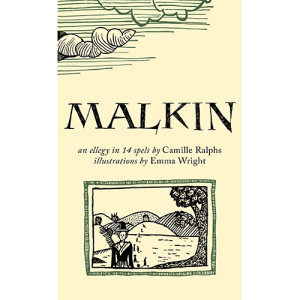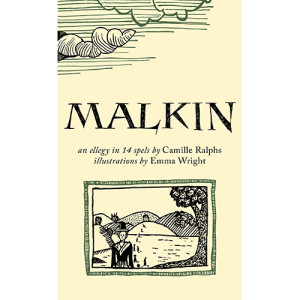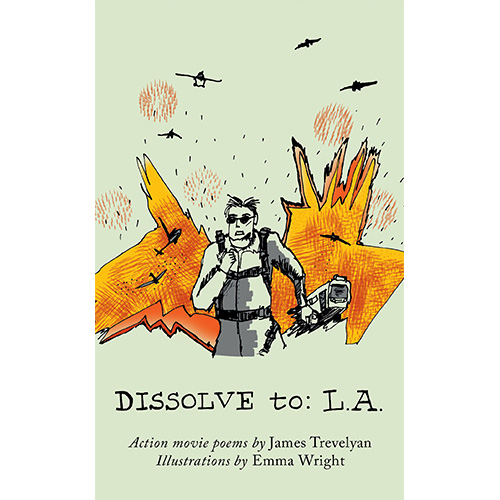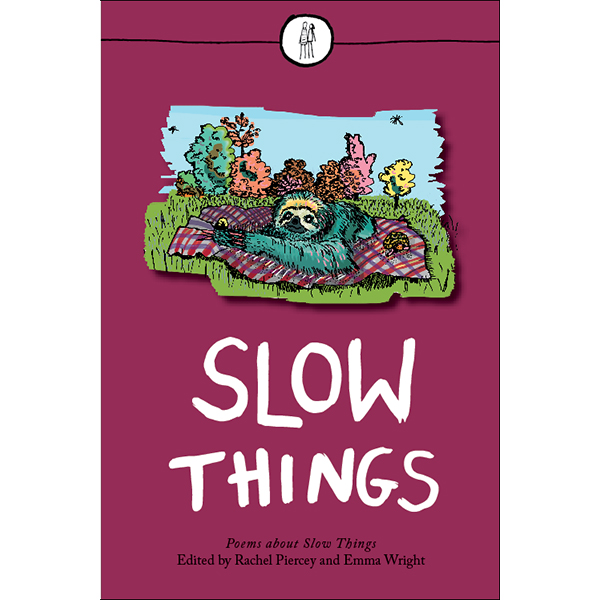MAKE IT GNEW: Malkin by Camille Ralphs
-Reviewed by Dominic Hale–
Malkin is Camille Ralphs’ astonishing and idiosyncratic debut pamphlet. Beautifully illustrated by publisher Emma Wright (The Emma Press), the sequence takes its title from the name of the Lancashire home of Elizabeth Southerns and her granddaughter Alizon Device, two women accused of witchcraft during the notorious Pendle Witch Trials of 1612. Styled ‘an ellegy in 14 spels’, the collection comprises a series of ‘epitaphic monologues’, a form ‘borrowed’ from US poet Edgar Lee Masters’ Spoon River Anthology (1915) as is made explicit in Ralphs’ acknowledgements. With the exception of the invocational opening ‘Pendle Hill’, the poems present themselves as the monologues of the thirteen accused inhabitants of the Forest of Pendle, the last of which is spoken by Jennet Device, a child of nine who indicted the other suspects (including her own mother and brother) as outlined in the pamphlet’s introductory ‘Historical Note’. ‘Pendle Hill’ opens the book with thirteen prose versets of catechistic, knelling repetitions, an overture introducing the principal speakers and offering up an equivocal glimpse of the poet:
Me, green as a symphony, steepling off into tomorrow’s air. You, fishing in the dingle, in the rising of the waters, for a prize of pillow-talk or humble pie, for the vast mirage of the future – of voices hollow, small as flutes of grass.
Listen.
The poet illusorily steeples off, an elusive presiding genius leaving her readers with the dramatic voices of the accused, the speechless dead orchestrated offstage into a symphony of ‘mongrel / yyammerringg’. The self-description here reminds us of Marvell’s ‘The Garden’, the poet’s organising mind withdrawing ‘into its happiness’ and ‘Annihilating all that’s made / To a green thought in a green shade.’ Moreover, the reader is figured as Eliot’s (not so impotent?) Fisher King, hunched over history’s waters in search of a ‘prize’ of meaning and order, a flicker of atonement for or resuscitative lesson from the atrocities of the past. The insinuation is that poet and reader will work in symbiosis ‘t bring bak [the] tongue’ of the executed, a purpose hazarded by the final line of ‘Alice Nutter’.
Most conspicuously, Ralphs’s poetic utilises free spelling, the (intended) effects of which are delineated in an appended note at the back of the pamphlet: ‘semantic bridging’ (polysemy), ‘visual onomatopoeia’, intensification by association, and shock. Examining the etymologies of ‘spelling’ itself might intimate ways in which we should approach Ralphs’ experimental poetic. Of course, the word carries both its contemporary orthographic meaning and that pertaining to the performance of acts of witchcraft, immediately splicing together central concerns of Malkin. But further to this, the OED records that ‘spelling’ bears a latent, obsolete Old English meaning, that of ‘Speaking, talking, discourse, utterance … esp. ‘idle or unprofitable talk’’, which undoubtedly supports the pamphlet’s soliloquising, its monologic form. More suggestively, ‘spelling’ acquired a newer sense in the early twentieth century, chiefly in Scotland: ‘The practice of acting as a substitute for another or taking turns at some work or labour’. This obscure meaning seems to mimic the poet’s labour, her own ‘free spelling’ in attempting to speak for (and therefore in a sense substituting) the powerless dead, lost to waves of history, folklore and myth.
Illustrating the successes of Ralphs’ claims for free spelling, the first monologue (‘Elizabeth Sowtherns’, alias Demdike) is one of the more radical realisations of her method, a sonnet recounting Demdike’s alleged rendezvous with Satan in the guise of a little boy. It commences:
A boy gnew me by a stonepit. He steemed
in th sun stone-kneading, lighting trees like wicks;
his eyes were sofd as ash, and cities hymned
and chymneyed in the atlas of his sex.
Ralphs’ anarchic spelling ingeniously recalls both the contemporary Lancastrian vernacular and unstandardised early modern orthographies, while simulating in its unorthodoxy the appallingly violent othering of working class women by the state and culture in C17th England (King James VI and I himself published a tract on witch-hunting in 1597 entitled Daemonologie). The rendering of ‘knew’ as ‘gnew’ using the Middle English consonant cluster ‘gn’ recalls the at-one-ment of gnosis and religious revelation, remembering the (Greek) etymological roots of English’s ‘knowledge’; consequently there is both a pagan and Christian resonance to the ‘gnowledge’ of the ‘boy’-devil in addition to the erotic associations of the verb ‘gnew’ in this context. Such a distortion of the word ‘knew’ signals our own divorcement from the truth and from true knowledge of the past. Wikipedia informs us that the ‘g’ in ‘gn’ stopped being sounded in the C17th, making unclear our readerly pronunciation of the word; pronunciatory ambiguities echo the ambiguous proliferation of meanings afforded by nonconformist spelling. In addition, Ralphs’ substitution of ‘d’ for ‘t’ in ‘sofd’ onomatopoeically softens the sound of the word in swapping in a ‘softer’ plosive. The tragic, unambiguous finality of the poem’s closing sentence is accentuated by the eccentric exuberance preceding it: ‘I died in prison.’ This declarative simplicity anticipates the harrowing plainness of the sequence’s final line, the complicit child Jennet Device’s affecting ‘Please, forgive me’: paradoxically, instances of received spelling attain a renewed significance through difference, jarring with Ralphs’ prolific orthographic unconventionalities.
Malkin is perhaps a descendent of Geoffrey Hill’s 1968 collection King Log, sharing affinities with his historical, pseudo-mythologising ventriloquisms and seriously concerted effort to retroactively atone for the suffering of the dead through poetry. However, Hill’s mining of English etymology is subverted by Ralphs’ destabilising use of ‘heretical’ free spelling, despite her own clear faith in latent etymological resonance as a means of combing meaning from history. This refusal to adhere to conventional spelling reflects the dissident, excluded voices Ralphs seeks to revive and atone for in comparison with those of Hill: though the latter affectingly elegises his working class grandmother in ‘XXV’ of Mercian Hymns, his poems more readily remember men of power or ‘genius’, with the epigraph to the sonnet sequence ‘Funeral Music’ naming aristocrats beheaded during the Wars of the Roses for example. Malkin is an important testament to the suffering of powerless working class women without a voice in history, a generous attempt to name and bear witness to acts of atrocity perpetrated against those who could not speak. Moreover, the sequence stresses the ethical obligation to risk appropriation in speaking for those long-dead whose real pain is so often in danger of anodyne translation into the estranging province of myth. As ‘Jane Bulcock’ suggests:
… we’re damned
if we do; and we,re certainly damned
if we don,t.
Malkin is a mesmerising series of poems, by turns serious and playful, accessible and innovative, musically exuberant and delicately formed.






